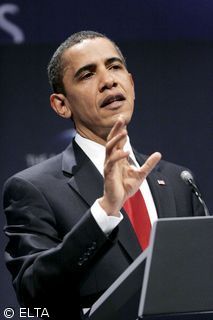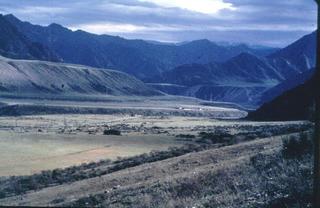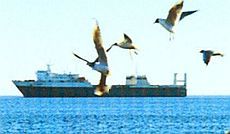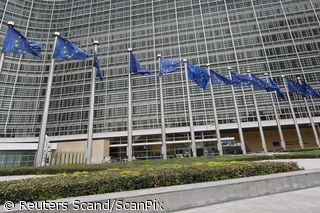It is the only source that can provide a chance for economic breakthrough
Published:
21 March 2005 y., Monday
Money from Russia’s Stabilisation Fund is expected to be invested abroad in dollar-nominated securities, with minimum investment risks and minimum profitability at 2-4%. These funds have until now been kept in Central Bank accounts. This means that a great deal of money will soon appear on the financial markets. On February 1, 2005, the Fund totaled 647.2 billion roubles ($23.1 billion), which mostly came from taxes on oil sales with prices exceeding $20 per barrel and export duties from oil companies.
The crucial question is how this money should be used. Money can only be taken out of the Fund when it has more than 500 billion roubles. Therefore, more than a fifth of its resources can already be used. This is a key issue for Russia’s economy, as the positive overseas market situation in recent years has been almost exclusively responsible for its growth.
However, experts are not tired of repeating that the potential of the resource-oriented Russian economy has been virtually exhausted. The mechanism whereby "we produce oil, sell it and enjoy the benefits" is becoming increasingly less effective. The country is now at a stage when it must introduce an industrial policy. However, any policy only makes sense when there is money to implement it.
Russia’s stock market and banking system do not provide the necessary financing for the real sector of the economy. Direct foreign investment in Russia remains at a very low level, while foreign investment in general is concentrated on either the import of equipment or foreign borrowings. The country obviously needs sources for further growth. The Stabilisation Fund is virtually the only potential source today and a genuine war is being waged for its funds.
Šaltinis:
financialexpress.com
Copying, publishing, announcing any information from the News.lt portal without written permission of News.lt editorial office is prohibited.
The most popular articles
 Standard & Poor's (S&P) affirmed Lithuania's long-term investment grade sovereign foreign currency BBB credit rating and removed it from a CreditWatch negative position, citing government commitments to address deteriorating public finances.
more »
Standard & Poor's (S&P) affirmed Lithuania's long-term investment grade sovereign foreign currency BBB credit rating and removed it from a CreditWatch negative position, citing government commitments to address deteriorating public finances.
more »
 The EBRD-EIB Multilateral Carbon Credit Fund (MCCF) and Azerenerji Joint Stock Company are collaborating in order to promote energy-efficient power generation in Azerbaijan.
more »
The EBRD-EIB Multilateral Carbon Credit Fund (MCCF) and Azerenerji Joint Stock Company are collaborating in order to promote energy-efficient power generation in Azerbaijan.
more »
 U.S. President Barack Obama, meeting with the leaders of Mexico and Canada, called on all three nations hit by the global recession to avoid resorting to protectionism.
more »
U.S. President Barack Obama, meeting with the leaders of Mexico and Canada, called on all three nations hit by the global recession to avoid resorting to protectionism.
more »
 A 10-year $75 million EBRD loan will finance the construction of a combined heat and power plant in the east Siberian city of Krasnoyarsk which is expected to improve energy efficiency and cut pollution by 14 percent thanks to the use of more environmentally-friendly technologies.
more »
A 10-year $75 million EBRD loan will finance the construction of a combined heat and power plant in the east Siberian city of Krasnoyarsk which is expected to improve energy efficiency and cut pollution by 14 percent thanks to the use of more environmentally-friendly technologies.
more »
 The Directorate-General for Competition has issued a review of the aid schemes introduced by Member States and approved by the Commission during the financial crisis.
more »
The Directorate-General for Competition has issued a review of the aid schemes introduced by Member States and approved by the Commission during the financial crisis.
more »
 Rescue planes from New Zealand have been taking part in a massive search for passengers after a ferry sank off the coast of Tonga. At least 27 people are missing.
more »
Rescue planes from New Zealand have been taking part in a massive search for passengers after a ferry sank off the coast of Tonga. At least 27 people are missing.
more »
 Courtney Adams has always loved cooking. As a kid she baked brownies for her friends and in college her apartment was the place to go to for a home-cooked meal. But she never thought she'd cook for a living.
more »
Courtney Adams has always loved cooking. As a kid she baked brownies for her friends and in college her apartment was the place to go to for a home-cooked meal. But she never thought she'd cook for a living.
more »
 The European Commission has authorised, under EC Treaty state aid rules, a scheme offering reduced-interest loans to businesses investing in the production of environmentally friendly products, as part of the German package to tackle the current economic crisis.
more »
The European Commission has authorised, under EC Treaty state aid rules, a scheme offering reduced-interest loans to businesses investing in the production of environmentally friendly products, as part of the German package to tackle the current economic crisis.
more »
 Ramūnas Bičiulaitis, former board member and financial director of AB LEO LT, starts working as head of the Finance Department of Danske Bankas.
more »
Ramūnas Bičiulaitis, former board member and financial director of AB LEO LT, starts working as head of the Finance Department of Danske Bankas.
more »
 The EBRD has kept up a rapid pace in the syndicated loans market, defying difficult market conditions and pulling together nine deals so far this year, worth a total €1.2 billion.
more »
The EBRD has kept up a rapid pace in the syndicated loans market, defying difficult market conditions and pulling together nine deals so far this year, worth a total €1.2 billion.
more »